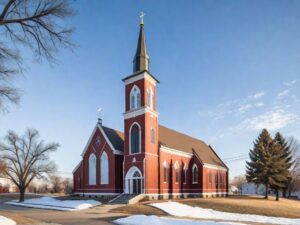American Hungarian Reformed Church church has played a main role in preserving the cultural heritage of Hungarian-Americans. As Hungarian immigrants arrived on American shores in the late 19th and early 20th centuries, they brought with them a deep-rooted sense of tradition, including their language, cuisine, and religious practices.
Founded by Hungarian immigrants seeking solace in their faith and connection to their homeland, the American Hungarian Reformed Church became a focal point for the community. Within its walls, the Hungarian language echoed, traditional hymns were sung, and religious ceremonies were conducted in ways that mirrored the practices back in Hungary. This became a hub where Hungarian traditions thrived.
Preserving Language and Cultural Practices
In the context of the Hungarian community in the United States, maintaining the Hungarian language is a testament to the resilience of the diaspora. In the American Hungarian Reformed Church, Hungarian continues to be spoken, taught, and revered. Language classes, conversation groups, and cultural events held within the church premises serve as platforms where young and old alike can immerse themselves in the melodious sounds of their native tongue.
The American Hungarian Reformed Church hosts a myriad of events throughout the year, each meticulously curated to celebrate folk dances and traditional cuisine. These events serve as reminders of the beauty embedded in our traditions.
The younger generation often finds itself torn between embracing the customs of their ancestors and adapting to the mainstream culture. Embracing technology can bridge the gap between generations. Interactive language learning apps, online cultural workshops, and virtual tours of Hungarian historical sites can captivate the interest of tech-savvy youth. The American Hungarian Reformed Church can leverage social media platforms to create engaging content, showcasing the allure of Hungarian traditions in a contemporary light.
Partnering with schools and universities can pave the way for incorporating Hungarian language and culture into mainstream curricula. By introducing these elements at an early age, we not only impart knowledge but also nurture a sense of pride and belonging among the younger members of the community.
Cultural Exchange and Community Outreach
The American Hungarian Reformed Church has been organizing cultural exhibitions, workshops, and festivals that showcase the richness of Hungarian traditions. These events instill a sense of pride and belonging among our own community members.
The church has actively engaged in philanthropic endeavors that extend a helping hand to those in need. By organizing fundraisers, food drives, and educational programs, the church has made a tangible difference in the lives of individuals, both within community and beyond.
Partnering with local organizations, schools, and businesses amplifies itsvimpact. Joint initiatives, such as cultural exchange programs with schools or collaborative charity events with local businesses, create a ripple effect of positive change.
Education emerges as a powerful tool in overcoming these hurdles. By promoting cultural literacy and dispelling misconceptions, it geves the way for mutual respect and acceptance. Workshops, seminars, and interactive sessions can bridge gaps in understanding, fostering an atmosphere of unity and tolerance.
The church can expand its outreach programs to encompass online audiences. Webinars, virtual cultural tours, and interactive sessions can bring Hungarian traditions into the homes of people across the globe.
Sustaining Religious Practices and Festivals
From the solemnity of Easter to the joyous celebrations of Christmas, these festivals provide a sense of continuity, connecting us with our ancestors and uniting us as a community. The American Hungarian Reformed Church meticulously upholds the customs and rituals associated with these festivals.
 The church actively engages in organizing religious processions, prayer services, and communal feasts during these festivals. These events are occasions for families and friends to come together, reinforcing bonds and creating lasting memories. By maintaining the authenticity of these traditions, the church ensures that each festival is a meaningful and spiritually enriching experience for all attendees.
The church actively engages in organizing religious processions, prayer services, and communal feasts during these festivals. These events are occasions for families and friends to come together, reinforcing bonds and creating lasting memories. By maintaining the authenticity of these traditions, the church ensures that each festival is a meaningful and spiritually enriching experience for all attendees.
The American Hungarian Reformed Church conducts religious education classes, teaching the younger generation about the significance of prayers, hymns, and religious texts. This educational initiative fosters a deep understanding of faith, ensuring that the next generation is well-equipped to carry forward our religious traditions.
The church has embraced technology to bridge the gap between the faithful and religious teachings. Live-streamed services, online prayer groups, and digital religious resources allow community members to participate in religious activities from the comfort of their homes, ensuring that no one is left behind due to geographical constraints.
It can encourage active participation in religious festivals by involving the community in the planning and execution of events. By empowering the members to take an active role in religious activities, the church ensures that the traditions are not just observed but celebrated with enthusiasm and passion.
Preserving traditions requires resources, and funding cultural events, language programs, and outreach activities demands financial stability. Securing sponsorships, organizing fundraising campaigns, and encouraging community contributions become necessary to sustain these efforts and ensure their long-term impact.
Creating online communities, sharing educational content, and organizing virtual events allow the church to reach a broader audience, including younger members who are more tech-savvy.
Encouraging active involvement, seeking feedback, and involving community members in decision-making processes instill a sense of ownership. Open dialogues, cultural exhibitions, and community workshops create a sense of belonging and pride, reinforcing the importance of preserving our cultural identity.
Through its unwavering dedication to preserving language, cultural practices, religious rituals, and community engagement, the church ensures that the vibrant tapestry of Hungarian heritage continues to enrich the lives of generations to come. As it navigates the challenges of the modern world, the church remains committed to its mission, embracing change while safeguarding the essence of Hungarian traditions.
